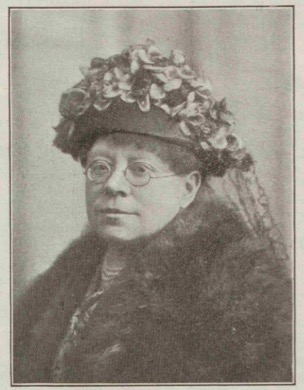

We hold that only by making happiness for those around us, and by endeavoring, individually, to make the world a little brighter for our having lived in it, can we hope to gain happiness for ourselves.
Louisa Samson, ‘Why Women Should be Secularists‘ (1891)
Louisa Samson, who later became Louisa Thomson-Price, was a suffragist, businesswoman, journalist, poet, and staunch supporter of the secular education movement. Known during and after her lifetime as an exceptional woman by those with whom she interacted, she was a champion of humanist principles in her approach to children’s secular education and how this intersected with women’s rights. While mostly lost to history, she stands as an exceedingly skilled woman in writing, activism, and economics. In her emphasis on education and equality, she connects with others of her time and before, like Florence Dixie and Mary Wollstonecraft.
We believe in concentrating our efforts upon the improvement of this world, which is all the world we know of.
Louisa Samson, ‘Why Women Should be Secularists‘ (1891)
Louisa was born in 1864 in Reading to Matilda and Henry William Sowdon. When Matilda was pregnant with Louisa, she divorced her husband due to physical and verbal abuse and was married in 1870 to Thomas Caudwell. Louisa was educated as she grew and, in 1886, she published her writing and artwork in the book Comics Sketches and Sober Thoughts. Reviewers in the Nottinghamshire Guardian described it as ‘a pleasant little book’, with the artwork being ‘done with considerable skill’. Her artwork would feature in several newspapers, including the Daily Mail and the Political World.
She was involved in several suffragist groups, including the Women’s Liberal Federation, the Women’s Freedom League (WFL), the Women’s Tax Resistance League, the Society of Women Journalists, and the National Union of Women’s Suffrage Societies (NUWSS). These groups would influence her work as a suffragist on taxation, and women’s pursuit in business and economics, alongside her secularist views. In many of these groups, she held positions of responsibility and leadership.
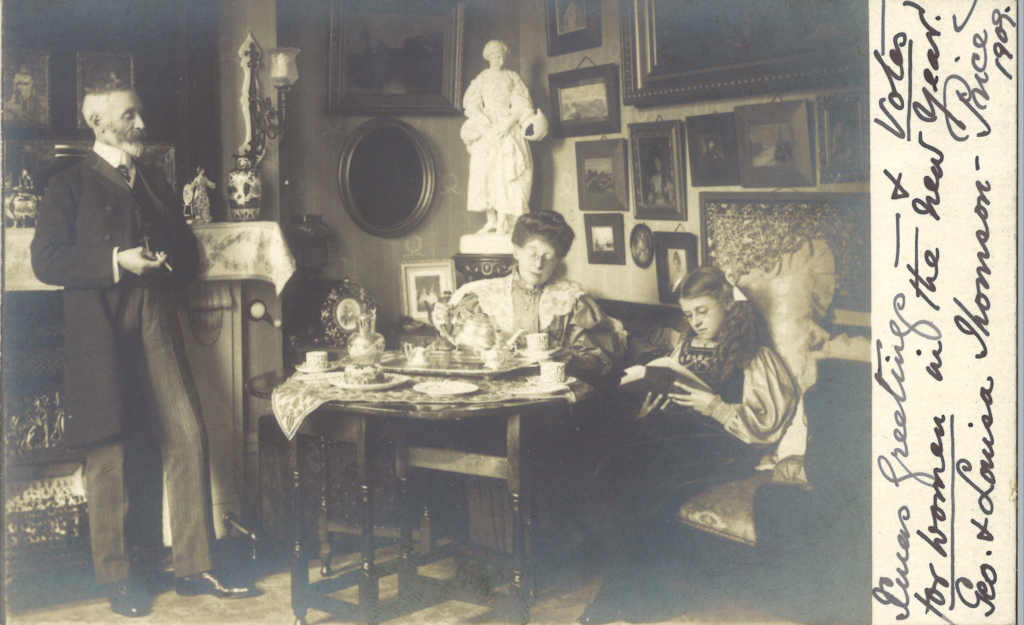
She was honorary secretary of the North Hackney Women’s Liberal Association, an official lecturer for the Women’s Liberal Federation, and a member of the Council of the Society of Women Journalists. Notably, she was part of the National Secular Society (NSS) and was a strong admirer of Charles Bradlaugh, describing him as ‘an apostle of Freedom’. During this time, she met her first husband, John Samson, a member of the executive of the NSS, who she married in 1888. She would later protest, with his backing, the use of his name on the local electoral register when she was the one who purchased their home. She described the secular movement in relation to her work as a suffragist:
Suffragists are not the only reformers who had to gradually win a hearing.
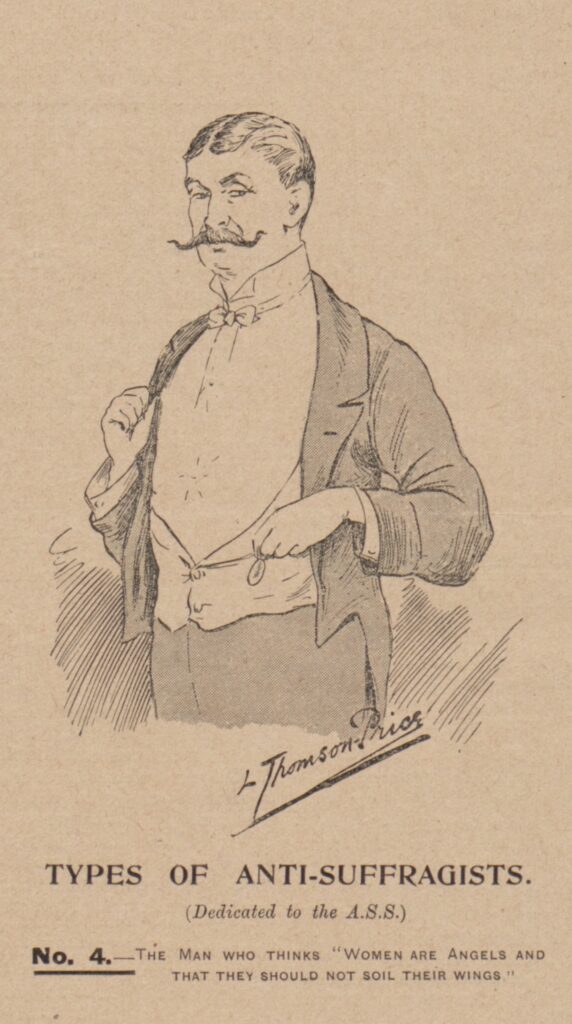
The NSS would fuel her secular views and lead to her writing the lecture, ‘Why Women Should Be Secularists‘, published by the Progressive Publishing Company, which Robert Forder oversaw at 28 Stonecutter Street, London. Notably, at the same time and address, the Freethought Publishing Company was formed by Bradlaugh and Annie Besant (and would be taken over by Forder after Bradlaugh’s death). Samson’s lecture took aim at the Christian Church for teaching the subjection of women, and argued for secularism, which Samson called ‘the religion of this life’. Specifically, the lecture emphasised the good that secular education does for raising tolerant children. In 1907, after the death of her husband John, she married George Thomson-Price, becoming Louisa Thomson-Price.
Some of Louisa’s most visible work can be found in The Vote, the official newspaper or ‘organ’ of the Women’s Freedom League. She worked as a cartoonist, writer, consultant editor, and director for the newspaper. It began publication on 8 September 1909, and included work from famous suffragist writers like Cicely Hamilton. Louisa illustrated the very first cartoon for the newspaper on 4 November 1909. She would continue to write and produce cartoons for the newspaper for several years. In the 21 September 1912 issue, her art appeared on the front page. She would also contribute a series of 12 cartoons depicting stereotypical ‘Anti-Suffragists’ from 25 November 1909 to March 1910, which the WFL would later produce as postcards.
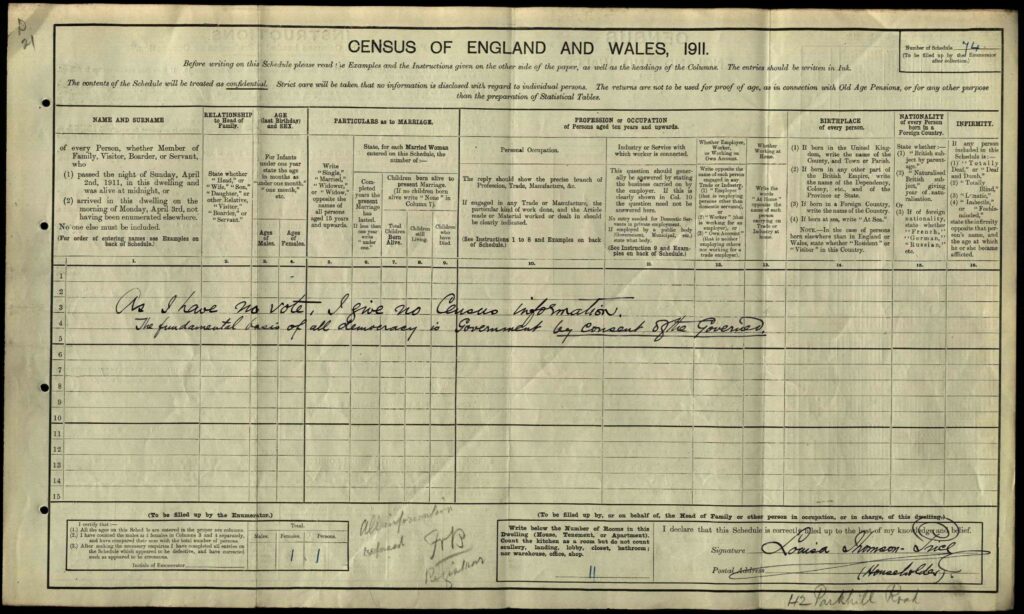
In her work as a suffragist, she was a vocal advocate of the right of women to vote, and firmly against the governance of women without proper representation. She described taxation without proper representation as ‘legalized robbery’, and was part of the Tax Resistance League (TRL). On 18 May 1914, some of hers and other members’ things were sold at the Fitzjohn Estate Auction Rooms in an attempt to recover the money that would have been received from taxation. She, alongside the other members, used the auction as a chance to lecture a crowd about the cause of the TRL. She also boycotted the 1911 census, stating:
As I have no vote, I give no census information. The fundamental basis of democracy is Government by consent of the governed.
However, the barriers to her rights as a woman at the time did not prevent her from being an extraordinary businesswoman. She was the chairman of Slaters Ltd. catering firm, vice chairman of S. Hildesheimer & Co., director of Minerva Publishing Company, and Governor of the Universal Cookery and Food Association. Fellow writer and suffragist Lucy H. Yates, in a tribute piece to Louisa, stated: ‘It is unusual, even in these days, for a woman to wield such an influence in the business world.’ Not only did Louisa have immense power in her positions, but she revolutionalised many places where she worked. As Chairman of Slaters, which was particularly popular with women, she ‘supervised the buying, evolved fresh colour schemes for the dining rooms, and designed pretty uniforms for the waitresses.’ By May 1925, the profit of Slaters was over £26,000. She was also a shareholder in several companies, including Harrods, Raphael Tuck, and Spiers and Pond. Even as her health began to decline later in life, she would continue her work when bedbound, and would request to be carried to the board room to conduct meetings.
Louisa Thomson-Price died on 14 June 1926. In her will, she left her clothes, furniture, and £6,000 to Mary Ann McIntosh; £1,000 to the Home of the Aged Poor; £1,000 to fund a bed at the Elizabeth Garrett Anderson Hospital; and £500 to the Women’s Freedom League. She was given a front-page spread tribute in The Vote by Lucy H. Yates, describing her as having ‘splendid courage, self-control integrity, boundless energy, and industry’. The extensiveness of the tribute speaks to the work that Louisa had done throughout her life to help the causes she was passionate about, like women’s rights and humanist values. The tribute’s closing words echo this sentiment entirely:
An ardent enthusiast, with very broad sympathies, she never stayed her hand when her pen could be used, nor her voice when speech could help any cause.
Louisa Thomson-Price | Spartacus Educational
Louisa Thomson-Price | Women Who Meant Business
Lucy H. Yates, ‘The Garden of Experience’ in The Vote (16 July 1926)
Elizabeth Crawford, Art and Suffrage: A Biographical Dictionary of Suffrage Artists (2018)
M.O.K., ‘Louisa Thomson-Price’ in The Vote (14 May 1910)
‘Correspondence’ in Women’s Franchise (July 22 1909)
‘Other Societies’ in The Vote (22 May 1914)
Price, Geo. & Louisa Thomson. 1909. Postcard. LSE Women’s Library, London
‘Recent Wills’ in Hampstead News (2 September 1926)
‘Women Chairman of Slaters Ltd.’ in The Vote (15 May 1925)
By Noura Almane
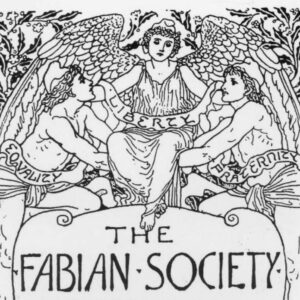
If any delegate present thinks that the Fabian Society was wise from the hour of its birth, let him forthwith […]

Can there be a more important human condition than dignity? Without it, we are bitter, downtrodden, unheard, humiliated, embarrassed and […]
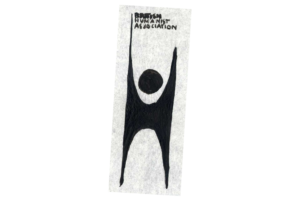
Humanists UK began as the Union of Ethical Societies in 1896, becoming the Ethical Union in 1920, the British Humanist […]
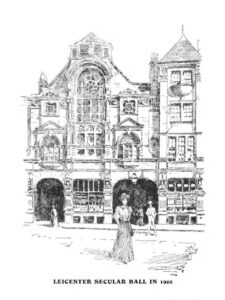
I might fill columns with tales of the debaters, co-operators, socialists, individualists, critics, artists, scientists, clergy and cranks, who, as […]